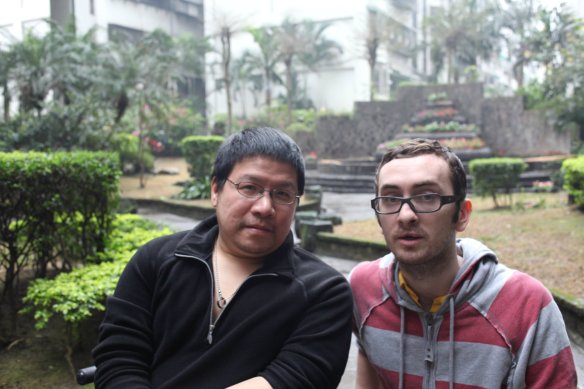
A few years ago I was digging around trying to find some good Chinese-language podcasts to listen to when I came across an old radio program which had been archived online called 「真情酷兒」(Sincere Queer). As I was working on a piece for eRenlai involving the gay rights movement in Taiwan I got in touch with the presenter of the program Vincent Huang. I ended up interviewing him on his role as an activist for gay and disabled rights as well as disabled rights within the LGBTI community, which you can view below:
Vincent has recently relaunched the program on another platform, branding it 「真情酷兒1.0」(Sincere Queer 1.0). In the 「年夜飯」(Lunar New Year’s Eve dinner) edition, he talks to Taiwanese gay couple He Xiang and Wang Tian-ming (何祥和王天明) – featured in an Isabelle gay wedding cake (喜餅) commercial that got a lot of media attention when it came out- who have been together now for over 30 years. You can watch the commercial below:
The podcast is an interesting look into what it’s like to be an out gay couple in Taiwan, particularly on family occasions. As well as this, at around 7:37 in the download version of the podcast, the presenter uses the Taiwanese word 「kâu-gín-á」 (alternative Taiwanese audio here) in the context of the following Chinese sentence concerning mahjong:
「 雖然他們需要耐心,跟我這個kâu-gín-á打麻將。」
Although they need patience, to play mahjong with a … like me.
I’d heard the word “gín-á” or 「囡仔」 meaning children before, but not with the prefix “kâu” added. This rather appropriately for the time of year, turns out to mean “monkey”. So the term 「猴囡仔」 kâu-gín-á literally means an infant monkey, but is used in an affectionate way to refer to human children, in much the same way as we sometimes refer to kids as “little monkeys”. Here it is used as a form of self-effacement, in that he is referring to himself as relatively young and not as skilled at mahjong as his boyfriend’s mother. This kind of code-mixing between Taiwanese and Chinese is particularly common when it comes to humor, so it’s always good to learn Taiwanese if you want to be able to get the joke in conversations.
If you’ve learned any new Taiwanese expressions that you’d like to share with me over the Lunar New Year break or have any questions you can comment below or contact me.
